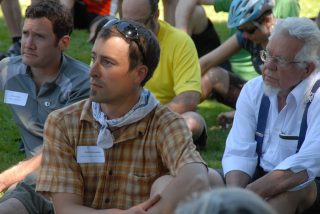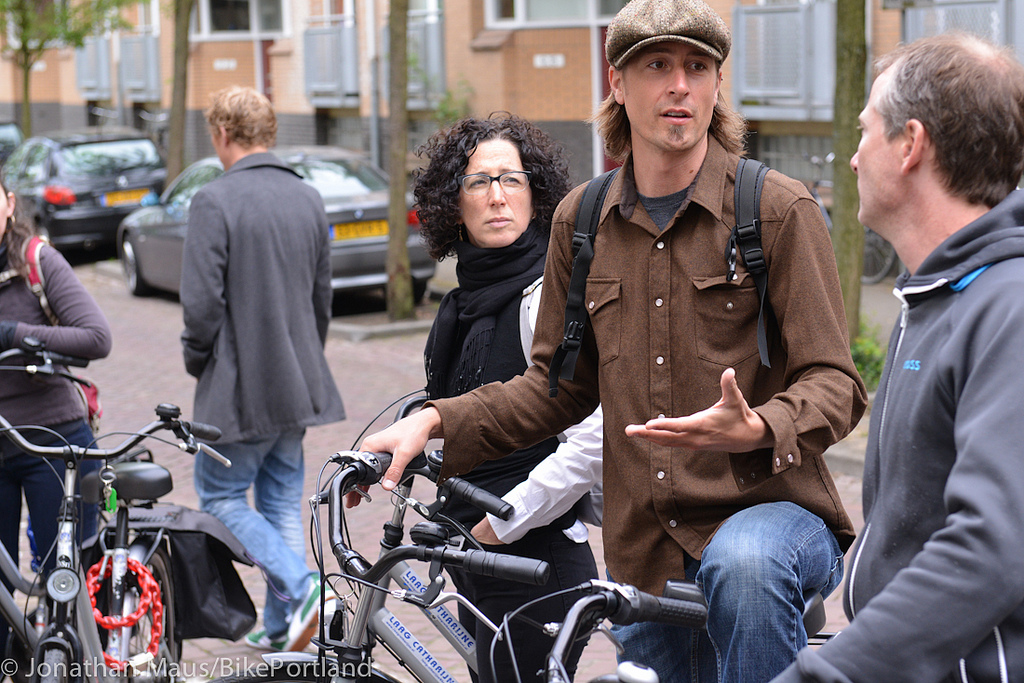



“It’s a bigger playing field with a lot more actors on it.”
— Gerik Kransky on how bike advocacy has changed since 2008.
The Street Trust has lost another senior staff member.
Gerik Kransky, who joined the organization in 2010 when they were known as the Bicycle Transportation Alliance, announced yesterday he’ll leave the organization at the end of this month. Kransky has accepted a position with the Oregon Department of Environmental Quality where he’ll help administer the Volkswagen Diesel Settlement grant program.
Kransky was The Street Trust’s policy director and was in charge of setting and executing the nonprofit’s approach to advocating for transportation policies, projects, and funding. In an email to BikePortland today, The Street Trust Executive Director Jillian Detweiler said Kransky (along with former staffer LeeAnne Fergason who left for a job at the Oregon Department of Transportation back in November), “Established the winning model that combined grassroots outreach with strategic lobbying.” Detweiler credits that approach for getting dedicated funding for Safe Routes to School in the $5.3 billion transportation package that passed the state legislature in 2017. “He laid the foundation for The Street Trust and its partners to have a powerful voice to assure that the next big regional transportation measure makes big gains for walking, biking and transit,” Detweiler added.
Margi Bradway, a transportation policy specialist who worked with ODOT and City of Portland Bureau of Transportation before taking a job at Metro back in October, said Kransky’s exit will be felt as a major loss to the community. “Gerik has been a consistent, thoughtful, direct yet measured voice of bike, pedestrian and transit issues on major transportation issues facing this state and region for the past eight years,” she shared with us via email. “I’ve worked with Gerik on major policy issues in all my capacities at ODOT, City of Portland and Metro. While it’s safe to say that we haven’t always agreed on things, we always respect each other and find a way forward.”
As one of the longest tenured staffers at The Street Trust, Kransky worked through major shifts in how bike advocacy in general — and The Street Trust in particular — works. I spoke to him on the phone this morning to ask for his reflections and insights…
What are the big shifts you’ve seen in bicycle advocacy in general?
“When I started we were just in the process of passing the [PBOT] 2030 Bike Plan and the BTA was running the “Build It” campaign. That really great moment in bike advocacy and policy coincided with the beginning of huge economic downturn that generated all these cut budgets. We had a really strong sense of what we wanted to do and all the sudden the money and political support for it kind of dried up. Looking at today’s landscape with the economy and a major conversation about housing and affordability and things in addition to bike stuff, I just think it’s a bigger world today. I think in transportation we’re facing new and different challenges: How are we contributing to and/or preventing displacement with our mobility choices and options? How are we going to respond to technology and the private sector playing a role that we’ve never really seen before? It’s a bigger playing field with a lot more actors on it.”
How did your job change in response to that change in the playing field?
“One of the things I led our organization into was more broad coalitions willing to work hard on funding. I don’t know if you’ve have a chance to learn about the Getting There Together Coalition. It’s a group that formed as TriMet was working on a 2018 ballot for transportation funding. TriMet assembled what they thought was a politically convenient package with three highway projects and one transit project. We’re the ones who stepped into that space and said, “Hold up, you’re missing the community voice and not being inclusive of the transportation future we want to see, let alone having a cogent strategy on housing.”
I feel we’re in a strong position now, and working together more strongly now than in the past. Our power is felt and respected. If we’re going to reflect on my eight years, the one thing I’m most proud of and most willing to say was a successful strategy has been our commitment to working with diverse coalitions and using those spaces to learn from our partners to grow our capacity and strengthen and change the discourse in a way we weren’t well-positioned to do on the regional or statewide stage as the BTA alone.”
Is there one policy you’re especially proud of?
“I would say that 75/25 fight in July 2010 [a decision by Metro Council to set aside 75 percent of a federal grant for active transportation projects]. If you look at the number of projects that have been built as a result of defending our federal flexible funds, it by far and away outstrips any individual policy or project in terms of the amount of impact being felt around the region.”
Advertisement
Some people criticize the shift away from local, street-level activism that helped establish the BTA years ago to the more conservative style adopted in recent years by The Street Trust. How do you respond to that? How do you explain that shift?
“It didn’t make sense to me to try and second-guess the project planners at their own game.”
“At end of the day we had to make a strategic choice about how we spend our limited resources in terms of staff, members, and volunteer energy. My calculus has been if we can only run a couple campaigns, we better run multi-million dollar campaigns. If we’re going to spend 6-8 months working on one decision — which you can easily on these individual, local projects — let’s create multiple projects for that one campaign. I will own that. And it’s very clear that that’s part of the genesis of new organizations [like Better Block PDX and Bike Loud PDX] that have sprung up to conduct some of that street-level work. We’ve intentionally tried to create more opportunities for more community groups to push for better projects; whether it’s sidewalks that are coming to the Brentwood neighborhood as a result of Regional Flexible Funds or the 20s Bikeway, or Biketown itself — all of those outcomes lead back to ensuring the revenue was there to make them happen in the first place.
We also can’t beat [PBOT Bicycle Coordinator] Roger Geller at his game. The professional staff at the PBOT understand what good infrastructure looks like. We don’t have that capacity inside our organization, so it didn’t make sense to me to try and second-guess the project planners at their own game. It’s clear they have political pressures that community organizations need to rise up against and address. It’s not because we don’t know good design, it’s because we have political pressure that mid-level bureaucrats can’t overcome, so there’s a real role for Better Block and for Bike Loud to be going out, knocking on doors and raising support for a project. Our goal — while we would never say we want to create more advocacy organizations — we do want communities to rise up and have the opportunity to build safe streets on their own. They only way we can do that is make more funding available and a create supportive policy framework. We chose that higher-level advocacy approach in recent years and we’re seeing the results of that now.
By your own admission, the bicycle excise tax was a policy struggle for The Street Trust. What are your thoughts about it now?
“I think it was a bad idea when it was proposed and it appears as though it is an ineffective policy as implemented. So it really feels like something we need to revisit at the state and have a conversation about its benefits and tradeoffs. As an organization, we can say we were glad to be at the table of HB 2017 [the transportation package the bike tax was a part of] because if we weren’t we wouldn’t be looking at $125 million of new funding for transit and Safe Routes to School. We forced those things to happen and we’re glad for that. If this bike tax was the backlash we ended up having to suffer from legislators who have an axe to grind with cyclists for not paying their way, that’s just politics. We fought and we lost on the bike tax. We are just going to have to keep up that fight in the future.”
Why are you leaving now?
“I want to see new leadership rise up, and for that to happen I had to step out of the way.”
“For me personally it’s time to take a step back from daily advocacy. I’ve been running campaigns like this for 20 years and it’s time for a change. I’ve been up-close and personal with a lot of public policy and politics and this opportunity with DEQ strikes me as a chance to go and do the work I’ve been advocating for for years; to get my hands into it and make it happen.
And I think there’s some real value in having someone else come in and lead. Eight years is a long time. I’ve taken up a lot of space in this conversation. I think there are smart people who I trust and respect who have criticisms to offer about the approaches we take. This is a community-led effort and for that to be true we need community members to have a conversation with The Street Trust and make their pitch. I want to see someone come in and follow the direction we’ve set up, or maybe they have a new idea of where we should go. I want to see new leadership rise up, and for that to happen I had to step out of the way.”
What do you want to tell the person who replaces you?
“Listen to your friends. If I could say anything, it’s really to listen to your coalition partners, to your allies, to well-intentioned folks in the public sector. And take the advice of smart people who’ve been doing this work for a long time. The most important point I want to highlight is to work in coalition in order to be as intersectional as possible. For us at The Street Trust as we’ve grown beyond just working on bikes, we’ve seen more opportunities, more partnerships, more meaningful collaboration across transportation spaces and housing spaces and I think that is a future that the next person in this role would do well to embrace.”
Kransky’s last day is July 30th. The Street Trust plans to hire a new advocacy and policy director to replace him.
— Jonathan Maus: (503) 706-8804, @jonathan_maus on Twitter and jonathan@bikeportland.org
Never miss a story. Sign-up for the daily BP Headlines email.
BikePortland needs your support.


